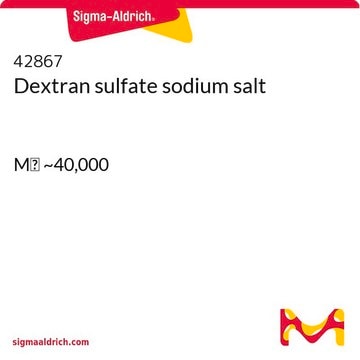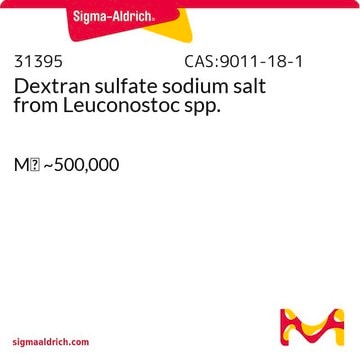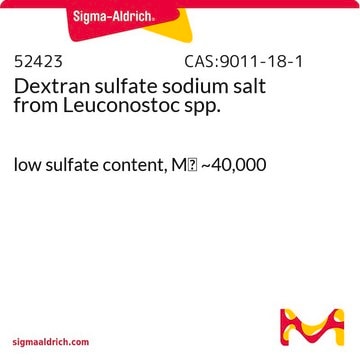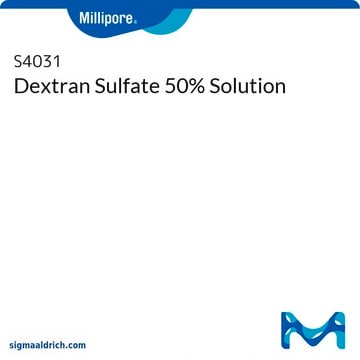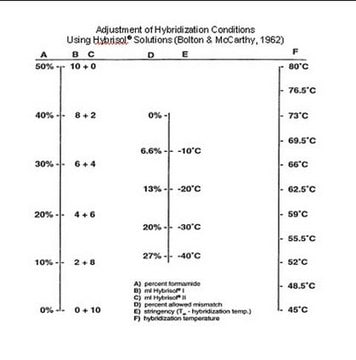51227
Dextran sulfate sodium salt
Mw 7,000-20,000
Synonym(s):
Dextran Sulfate Sodium
Sign Into View Organizational & Contract Pricing
All Photos(1)
About This Item
UNSPSC Code:
12352201
NACRES:
NA.25
Recommended Products
form
powder
mol wt
Mw 7,000-20,000
loss
≤10% loss on drying
color
white
useful pH range
6.0-8 (10 g/L)
solubility
H2O: 100 mg/mL, clear, colorless to faintly greenish-yellow
storage temp.
room temp
Looking for similar products? Visit Product Comparison Guide
Related Categories
General description
Dextran is a polymer of anhydroglucose. It is composed of approximately 95% alpha-D-(166) linkages. The remaining (163) linkages account for the branching of dextran.
Application
Dextran sulfate is routinely used for the selective precipitation of lipoproteins, probe hybridization membrane-immobilized DNA, the release of DNA from DNA-histone complexes, and the inhibition of RNA binding to ribosomes.
Biochem/physiol Actions
Dextran sulfate inhibits the replication of the human immunodeficiency virus by preventing the adsorption of the virus into host cells.
Other Notes
To gain a comprehensive understanding of our extensive range of Dextrans for your research, we encourage you to visit our Carbohydrates Category page.
Storage Class Code
11 - Combustible Solids
WGK
WGK 2
Flash Point(F)
Not applicable
Flash Point(C)
Not applicable
Certificates of Analysis (COA)
Search for Certificates of Analysis (COA) by entering the products Lot/Batch Number. Lot and Batch Numbers can be found on a product’s label following the words ‘Lot’ or ‘Batch’.
Already Own This Product?
Find documentation for the products that you have recently purchased in the Document Library.
Customers Also Viewed
M Baba et al.
Proceedings of the National Academy of Sciences of the United States of America, 85(16), 6132-6136 (1988-08-01)
The sulfated polysaccharides dextran sulfate and heparin have proved to be potent and selective inhibitors of human immunodeficiency virus type 1 (HIV-1) in vitro. Dextran sulfate (Mr 5000) and heparin (Mr 15,000) completely protected MT-4 cells against HIV-1-induced cytopathogenicity at
Our team of scientists has experience in all areas of research including Life Science, Material Science, Chemical Synthesis, Chromatography, Analytical and many others.
Contact Technical Service